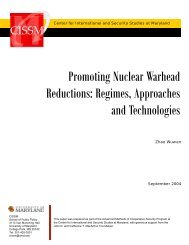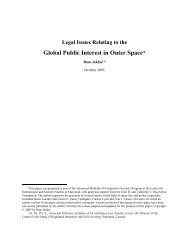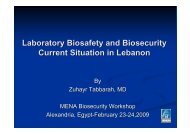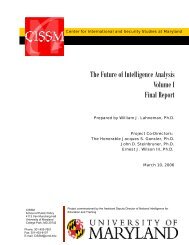A Reassurance-Based Approach to Space Security - Center for ...
A Reassurance-Based Approach to Space Security - Center for ...
A Reassurance-Based Approach to Space Security - Center for ...
- No tags were found...
You also want an ePaper? Increase the reach of your titles
YUMPU automatically turns print PDFs into web optimized ePapers that Google loves.
ANNEXElements of a companion agreement <strong>to</strong> OST:1. All countries have the right <strong>to</strong> access and use space <strong>for</strong> peaceful purposes, on abasis of equality and in a responsible manner that does not cause potentiallyharmful interference with other countries’ current or future use of outer space<strong>for</strong> peaceful purposes. All countries have a corresponding obligation <strong>to</strong> providereassurance that their space activities are peaceful and responsible.2. States Party <strong>to</strong> this treaty may chose Executive membership or Associatemembership. Executive members have representation on the Executive Counciland are assessed at a higher rate <strong>for</strong> the costs of the implementing <strong>Space</strong> <strong>Security</strong>Organization. All members participate in the Conference of States Parties,follow the rules of responsible space-faring behavior, and receive basic spacesurveillance in<strong>for</strong>mation. As their use of space expands, Associate members mayupgrade their membership <strong>to</strong> the Executive level with one year’s notice. Nonstateentities with a significant stake in space security may apply <strong>for</strong> observerstatus as Affiliates.3. No State Party shall encourage, cause, assist, or otherwise participate in spaceactivities by non-States Parties or other space users that are inconsistent with anyprovisions of this Treaty.4. During launch, operation, and end-of-life phases, each satellite must beregistered <strong>to</strong> a state that bears international responsibility <strong>for</strong> ensuring that allactivities are carried out in con<strong>for</strong>mity with this Treaty, the Outer <strong>Space</strong> Treaty,and other space security agreements. The Technical Secretariat of the <strong>Space</strong><strong>Security</strong> Organization created by this Treaty should maintain an expanded andcentralized <strong>Space</strong> Registry, which would include pre-launch notifications; basicin<strong>for</strong>mation about the function, opera<strong>to</strong>r, and orbital parameters of operationalsatellites; and plans <strong>for</strong> the safe disposal of the satellite when it reaches the endof its lifetime. This in<strong>for</strong>mation should be reported in a standardized <strong>for</strong>m thatcan be integrated with the <strong>Space</strong> Surveillance System operated by the TechnicalSecretariat. Responsibility <strong>for</strong> a satellite can be passed from a launching state <strong>to</strong>an operating state and from an operating state <strong>to</strong> a disposal state by means of aco-signed notification <strong>to</strong> the Technical Secretariat.5. Peaceful purposes exclude the placement of any type of weapon in outer space.They include the use of space-based in<strong>for</strong>mation and communication systems <strong>for</strong>military and intelligence purposes that are consistent with international law,including the Charter of the United Nations, in the interest of maintaininginternational peace and security and promoting international cooperation andunderstanding.6. Disputes about uses of space <strong>for</strong> hostile or coercive purposes that fall within thegrey zone of international law, neither clearly aggressive nor defensive, may bebrought <strong>to</strong> the Executive Council <strong>for</strong> a determination as <strong>to</strong> whether or not that32







